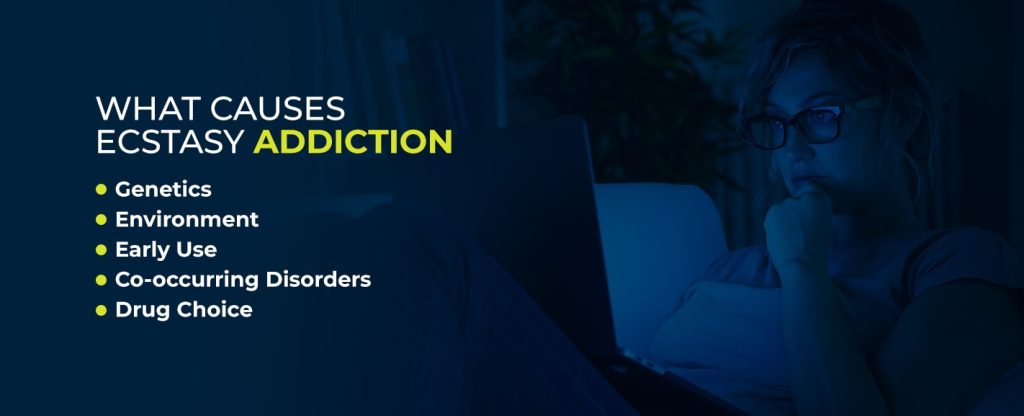
The exact cause of substance use disorder is more complicated than a single answer. There are many factors that may contribute to an individual’s risk of developing an addiction to ecstasy.
Substance use disorder can impact any person regardless of their gender, occupation, age, religion or any background factors. The risk of developing an addiction to ecstasy can be related to five factors — genetics, environment, early use, co-occurring disorders and drug choice. While these factors aren’t definitive in the exact reason for addiction, they can all play a role in a person’s journey.
People who develop a substance use disorder will have a different chemical reaction in their brain when using ecstasy than people who don’t suffer from addiction. Some people may think that addiction is solely to blame for lack of willpower, but the reality is that substance use disorder is a chronic condition that people can be susceptible to if it runs in their family.
The genetic factor for addiction can help explain why certain individuals can take substances regularly and not develop an addiction while others will. The National Institute on Drug Abuse states that half of a person’s risk for developing an addiction is rooted in their genetics and family history.
The type of addiction a person develops doesn’t have to be the same as a family member. If a parent has struggled with alcohol addiction, their child may have a higher risk for developing a substance use problem with any type of substance or activity.
A big contributor to an individual’s risk of substance use issues is the environment they grew up in or are currently experiencing. Some environmental factors that can influence a person’s risk for addiction include lack of parental engagement for teens or children, the area a person lives in or grows up in or substance availability.
Adolescents who have parents or guardians who play a small role in their daily routines can find themselves relying on their peers for decision advice. This can lead teens or young kids to have no one teaching them to say no to ecstasy or drug use.
The area a person grows up or currently lives in also plays a role in their risk of developing an addiction. Areas where drugs are readily available make it easier for people to use them at their leisure. Low-income areas are also impacted by substance use because of poor access to resources and education on the topic.
A person who begins experimenting with substances at a young age may increase their risk of having a substance use problem. Feeding into an addictive behavior at a young age can potentially lead to severe substance use problems and produce unwanted health effects.
Early substance use can make serious alterations to the brain and its development. This can make individuals more susceptible to mental health problems as they progress in their substance use disorder.
While starting drug use at any age can potentially lead to an addiction, early use is still a prominent factor in a person’s risk. Early use of ecstasy along with other factors like genetics, environment or trauma is something individuals should consider in substance use disorder prevention.
A dual diagnosis or co-occurring disorder describes a person who lives with substance use disorder and a mental health condition. Any mental health condition can increase the likelihood of developing a substance use problem, and substance use disorder is known to cause individuals to develop mental health conditions as a long-term effect.
A person with mental health conditions should take necessary precautions around substances like drugs or alcohol because they can intensify the symptoms of the substance and the condition. People may also turn to drugs like ecstasy to self-medicate when their symptoms of anxiety, bipolar disorder or any other mental health condition become too bothersome.
The substance a person chooses can impact the risk of developing substance use disorder. Some substances have more addictive characteristics than others, like cocaine, methamphetamines and heroin.
Ecstasy is addictive because of the intense serotonin release. After the effects of the substance wear off, people may continue to try and recreate the initial high they experienced. This process may lead to a cycle of using ecstasy and chasing after the wanted euphoric feelings. Because it’s difficult to know what additives are in ecstasy, someone using the drug may also be using other addictive substances.
Treatment for ecstasy addiction looks different for every person. Some people may have a more severe substance use disorder than others, they may need a better support system to guide them through recovery or they may need medical assistance with their withdrawal process. These differences require various levels of care to help offer effective treatments.
Consider the five levels of care that can help people across the board and slowly integrate them back into their normal lives.
The withdrawal symptoms of ecstasy can be overwhelming. They can make people feel sick and uncomfortable, and they are a huge reason why people have trouble stopping use of the substance. With withdrawal management or medical detox from Gateway Foundation, people can start off their recovery process with professional assistance.
Withdrawal management will provide patients with around-the-clock care and access to medical staff to help reduce the symptoms of withdrawal. In some situations, medication-assisted treatment is necessary to help make the process of withdrawal safe and tolerable for the patient.
Patients who require intensive addiction treatment and need a safe space to begin their recovery can benefit from residential inpatient treatment. An inpatient rehab program is a great option for individuals who need a space where there is zero access to ecstasy and they have 24/7 care from medical and mental health professionals. Residential treatment is a solid next step for people who first start with withdrawal management.
Patients who need a structured treatment program but have a safe home and quality support system to stay with at night can benefit from partial hospitalization programs. This program will have patients at a treatment facility all day throughout the week to go through their recovery plans, and then they’ll go home at night. This level of care is a great transition for people who start out in residential treatment or who need more assistance than outpatient treatment.
Individuals who need treatment but also can maintain their personal life obligations like work or school can benefit from outpatient treatment. Patients will schedule appointments throughout the week to receive the care they need to recover.
The last level of care from Gateway Foundation is sober living and ongoing support. These services and programs provide an easier transitioning process for people to get back to their lives. This level of care also helps people continue their new lifestyle and prevent relapse from occurring.

Addiction treatment centers can help people recover from ecstasy use, but it also teaches people how to live healthier lives. These two aspects and many others are excellent reasons to seek out treatment. Some other benefits of treatment include:
Do you have more questions about ecstasy addiction and treatment? Browse these common questions people have regarding the substance and recovery.
How addictive ecstasy is varies with an individual’s risk factors, but you can get addicted to ecstasy. While studies suggest MDMA isn’t as addictive as other substances, like cocaine, it does have addictive potential.
Yes. An ecstasy overdose is possible and can be life-threatening.
You may be prescribed withdrawal management medications depending on your situation. A medical professional will prescribe these medications based on your needs and suggest them in an amount that’s safe for withdrawal.
If you think that you or a loved one needs help recovering from ecstasy use, contact a treatment facility like Gateway Foundation to help you through the process.
Explore the latest resources from Gateway Foundation.
We use cookies to give you the best experience on our website. If you continue without changing your cookie settings, we assume that you consent to our use of cookies on this device. You can change your cookie settings at any time but if you do, you may lose some functionality on our website. More information can be found in our Privacy Policy.